![]() 1st Battalion 22nd Infantry
1st Battalion 22nd Infantry ![]()
Personal Recollections
of Cambodia
And Attack on LZ Valkyrie
By James Henderson B/1-22, 2nd Platoon
At 0900 hours on that morning of 10 May, Alpha Company is again in contact that results in 2 NVA KIA.
Water supply was a problem on Valkyrie until someone discovered a spring coming out the side of a small hill on the side of the base. The engineers somehow or other inserted a bamboo stalk, maybe 4” in diameter, into the spring at its source and split it on the other end so that it was a half trough.
They supported the entire affair on a bamboo trestle so that a person could come up to the trough at the end and get a drink or fill up canteens. That was mostly our source of water. After it had run for a day or two it was quite clear. We did also receive our water sometimes in either water trailers or water blivets brought to us via Hooks or flying cranes, Hooks were Chinook CH 47’s and the Cranes were Sikorsky CH 54’s. Blivets, as we called them, were very large thick rubber bladders. I don’t know how much water they held, maybe 500 gallons. The water, while perhaps drinkable, always tasted of rubber. Personally, I preferred the water at the bamboo trough.
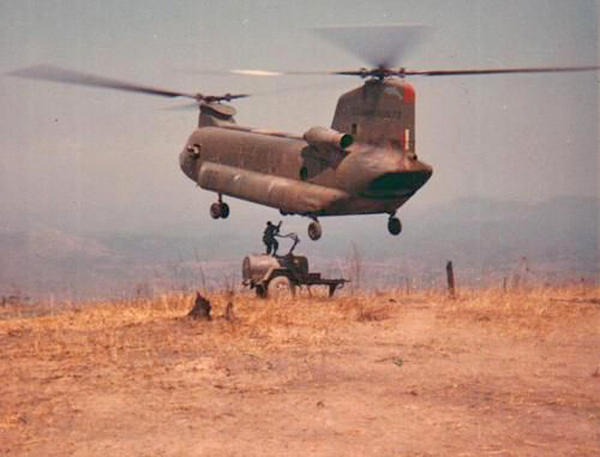
CH47 carrying a water tank
A request has come in for an OK for an air strike.
And at 0900 we are advised that Gen Wheelock is coming to Valkyrie, and at 1045 he does, in fact, visit A Company in the field. Gen Wheelock was the 4th Infantry Division Assistant Division Commander. Major Rabin speaks highly of him saying “He was a true solid soldier. Wheelock was the real deal in my book.”
|
MG John G. Wheelock As a Brigadier General, Photo from the United States Military
Academy |
The hunter killer teams are back on station at 1345. A little later Bde, Brigade Headquarters, announces that they want a statement from the hunter killer team about the friendly fire incident.
The air strike is completed at 1550.
Meanwhile on Valkyrie, that evening at 1825 hours, my buddy John Broussard is dusted off with a fever of 105.2. It proves to be malaria and we never see John again. I never knew what became of him. Many years later when I finally tracked down his hometown, I was very disappointed to learn that he had recently died, in 2000.
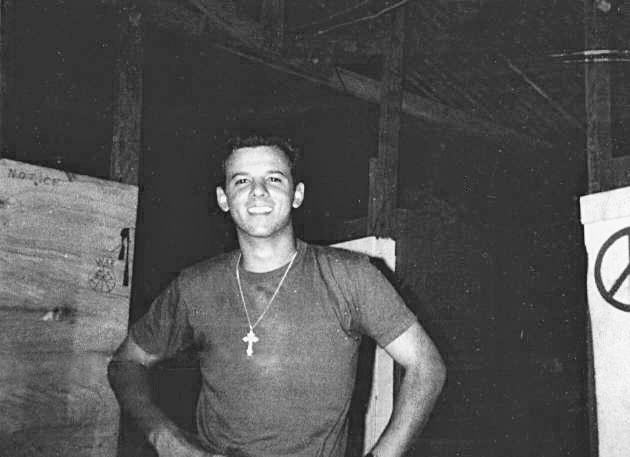
John Broussard in base camp just before going into Cambodia
At the time we entered Cambodia, we had what I would view as a full, five-man, squad. It consisted of SGT Buenzle, Greg Bodell, myself, John Broussard and Jeff Thurman. Losing John took us down to four men and we never replaced him. For the next month we operated with a four-man squad and then about mid-June we lost Bodell to his rotating home or DEROSing as we called it, Date Estimated Return from Over Seas. Then Buenzle became Platoon SGT, and I inherited the squad, or what was left of it but that’s a story for later.
Just before midnight at 2345 we have movement on the bunker line and illumination is employed. An unsettling pattern is emerging.
The next day, 11 May, at 0845 D company is sent to the grids where an air strike and gunships reported 21 NVA KIA the day before.
At 0900 the Engineer officer is requesting 5 or 6 pair of wire laying gloves.
The hunter killers are working 8 klicks west of us.
At 1130 hours Charlie Company 1-12, our sister Battalion, which had been op-conned, meaning temporarily assigned to the operational control of the 1-22 receives sniper fire and engages in a deadly firefight that results in 4 US WIA and 2 US KIA. Killed were SP4 James Olson and Medic SP4 John Verno. One of those wounded, Keith Franklin dies on the 12th and the next day Phillip Bennett dies from his wounds. I’m not certain but I believe Franklin and Bennett were both also Medics. Enemy causalities were 2 NVA KIA. Later Charlie Company also finds 6 charred NVA bodies that were evidently a result of the air strike.
General Arthur Collins, Commander 1st Field Force Vietnam (IFFV), visits LZ Valkyrie at 1300.
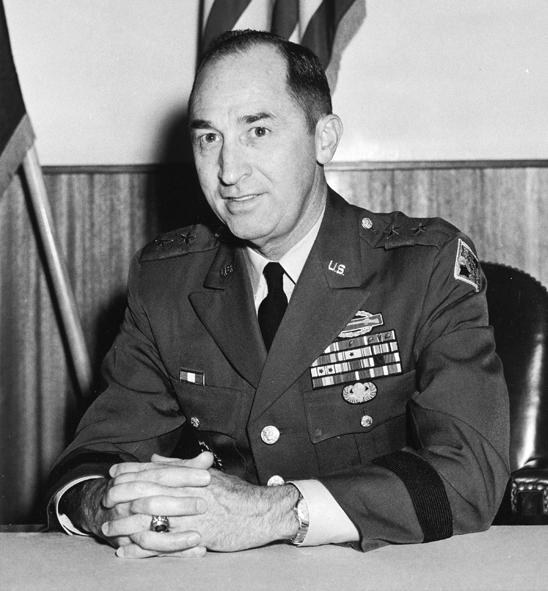
Arthur S. Collins as a
major General in Command of the 4th Infantry Division 1965-1967
As a Lieutenant General he would return to Vietnam and command
1st Field Force (IFFV) 1970-1971
Photo by Joe Leong from the Find A Grave website
At 1425 fast movers conduct an air strike. While LZ Valkyrie was not built on a mountain top per se, as many of our fire support bases were, it was on the highest ground around and we basically looked down on all things away from us. We had a ring side seat as we witnessed the fast movers strafe and make bombing runs on NVA targets in the near distance around us. I don’t know how many of these we witnessed but it was a fairly common occurrence all week. I was not then nor am I now an expert on jet aircraft, but I suspect they were F100’s dropping 500- and 1000-pound bombs and strafing with 20mm cannon fire.
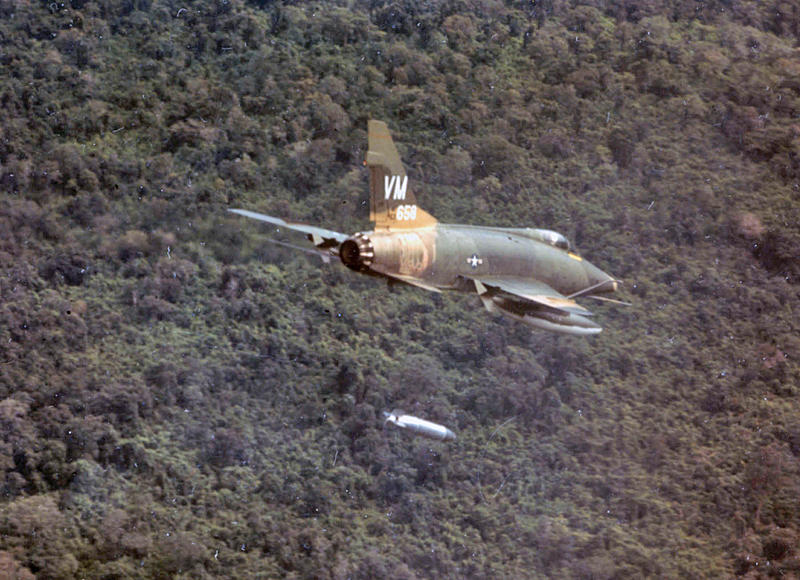
F-100 "Hun" on a bombing run in Vietnam
Photo from the National Museum of the United States Airforce website
At 1600, C Company reports finding what appears to be a booby trap training area containing, among other things, punji pits and spear traps.
At 2130 that night, 11 May, Delta Company has movement and engages in a firefight resulting in negative casualties.
I don’t recall if we did it every night or not, but we certainly did it on more than one night, everyone on the bunker line would open up with full firepower from their weapon all at once. We referred to this as a mad minute. It was an awesome display, that hopefully would deter the NVA. Not so.
At 0045, now 12 May, Bravo Co still in position on LZ Valkyrie is once again requesting illumination due to movement seen from the bunker line, we employ illumination. Negative results.
Then at 0345 we have more movement and pop hand flares, again negative results.
That morning at 0800, as we do our perimeter sweep before leaving on the cloverleaf’s, we find a cut trip wire leading to a flare, right in front of my position. In what has to be an all-time record for naivety, we think it to be a one in a million chance that a round from our mad minute the night before has cut the incredibly thin wire of a trip flare.
Hindsight being 20/20, we later realize that it was the enemy that had cut the wire while probing our position. It was indeed an ominous premonition of what was to come that night.
At 0835 Bde is requesting clearance for an air strike.
At 0950 we are advised the Bde CO is enroute to Valkyrie.
At 1300 hours Delta Company, in an effort to destroy a large hootch complex, sets fire to the hootches. The NVA had hidden, or stored, rounds in the thatch roofs and those rounds began to cook off in the fire. It caused quite a commotion, but no one was hurt.
At about this same time the hunter killer team reports finding 13 live-water buffalo and 8 dead ones.
An hour later the fast movers, jets, are on station and deliver another air strike.
At 1415 a Chinook, a CH47
helicopter, or simply Hook as we called them, comes to Valkyrie
and picks up a mini dozer that the engineers had used.
Once we had a Hook land at the fire base, not on the pad but in a
clear spot out in front of 3rd platoon. It had taken a blade
strike and a repair crew from base camp came out and repaired it.
The repair crew and the hook left before dark. There is no
mention of this occurrence in the Logs, so I do not know if this
was one and the same occurrence of the blade strike and coming to
pick up the mini dozer.
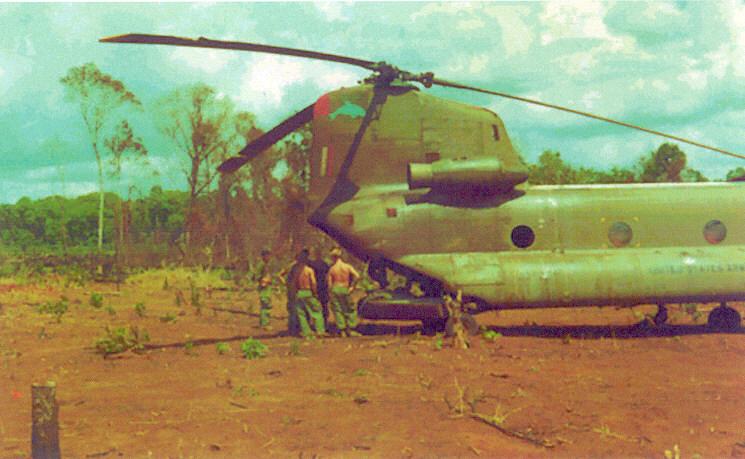
196th MHC "Flipper", Ch-47 emergency landing on FSB Valkyrie after blade strike.
Photo courtesy of George Heidt
At 1450 Recon finds a huge bunker complex with far too much equipment to list but among some of the odd or interesting items were 2 old flintlock rifles, an estimated total of 30,000 punji stakes. They found what seemed to be a blacksmith hootch with hammers and anvils. They found 25 pigs, 50 chickens, 3 dogs and 1 cat, lots of crossbows and arrows.
Home | Photos | Battles & History | Current |
Rosters & Reports | Medal of Honor | Killed
in Action |
Personnel Locator | Commanders | Station
List | Campaigns |
Honors | Insignia & Memorabilia | 4-42
Artillery | Taps |
What's New | Editorial | Links |